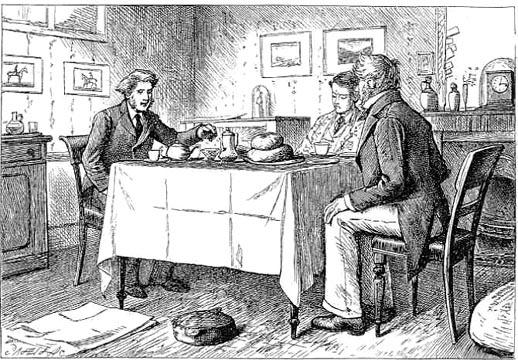Chapters
When studying any book for GCSE English, you must explain their use of language and interpret it in a way that shows an understanding of literary techniques.
Great Expectations by Charles Dickens is a classic novel that showcases the author's masterful use of language to create vivid characters and rich imagery, and it has been on the curriculum for a long time.
Dickens employs various language tools to convey deeper meanings in his writing and uses a number of techniques to get his messages across.

Charles Dickens and the Use of Naming
How Dickens named his characters is an important element of his writing, and is particularly evident within Great Expectations. Readers should look into the words to try and work out why Dickens has chosen these names for the characters.
For instance, a comical character in his books would often be given a comical-sounding name. An evil or untrustworthy character may be given a name that reflects this.
This can serve as a form of characterization and a subtle commentary on society. For example:
Pip (Philip Pirrip): The protagonist's name, Pip, is symbolic of his humble and unassuming nature. The name "Pip" suggests something small and insignificant, or even a pip from a fruit that can grow into a tree, mirroring Pip's initial social status and his struggle for self-improvement.
Miss Havisham: The name "Havisham" could be a combination of other words, have-is-sham. This is thought to be Dickens' reminder that “having” or possessing is not the meaning of life, something that is a key theme throughout.
Magwitch (Abel Magwitch): The name "Magwitch" sounds harsh and suggests a rough character, fitting for the convict who becomes a crucial figure in Pip's life. It also has a slightly mystical feel to it with the terms “magic” and “witch” amalgamated into one.
Jaggers: The name of the lawyer, Mr. Jaggers, implies sharpness and aggressiveness, reflecting his no-nonsense, business-like demeanour. The word sounds like “jagged” and may conjure images of knives or sharp edges.
Dickens uses these names as a form of shorthand characterisation, allowing readers to quickly grasp key traits and attributes of the characters.
Metaphor and Symbolism in Great Expectations
Dickens employs metaphor and symbolism to enrich the narrative and convey deeper meanings. Objects, settings, and events often carry symbolic significance.
Satis House. The decaying mansion where Miss Havisham lives is named "Satis," derived from the Latin word for "enough." The name symbolises Miss Havisham's state of frozen desire, as she remains stuck in the past, unable to move on. Her wedding dress also shows this frozen-in-time factor, as well as the fact that the clocks in her house have stopped.
Great Expectations. The title itself is a metaphor for Pip's aspirations and the societal pressure to rise above one's class. The phrase "great expectations" not only refers to Pip's financial prospects but also to the broader theme of ambition and social mobility.
Dickens subtly uses other types of symbolism such as bugs and insects throughout. Satis House has bugs and spiders within, creating a creepy feeling. When Pip is discussing Drummle and wants to explain that he is an ugly character, he says:
“Moths and all sorts of ugly creatures hover above a lighted candle but can the candle help it?”
Word Choice and Dialogue

Dickens's diction, or choice of words, plays a crucial role in conveying the social and emotional nuances of his characters. The dialogue in Great Expectations' is particularly rich, reflecting the diverse backgrounds and personalities of the characters and the span of time this Bildungsroman book covers.
Characters like Joe Gargery, Pip's brother-in-law, speak in a working-class vernacular. Joe's speech features a lot of simplicity, sincerity, and a lack of pretension. This choice of language reinforces Joe's humble and good-natured character.
“There’s one thing you may be sure of, Pip,” said Joe, after some rumination, “namely, that lies is lies. Howsever they come, they didn’t ought to come, and they come from the father of lies, and work round to the same. Don’t you tell no more of them, Pip. That ain’t the way to get out of being common, old chap.”
Characters like Mr. Jaggers, the lawyer, use formal and precise language, reflecting their professional demeanour. Jaggers's dialogue is often marked by a no-nonsense tone, emphasising his role as a pragmatic and efficient legal figure.
Miss Havisham's dialogue is a blend of nostalgia, bitterness, and madness. Her erratic speech patterns and frequent repetitions contribute to the portrayal of her fractured state of mind.
Dickens uses dialogue not only to advance the plot but also as a tool for character development, providing insights into the social context and individual personalities. Class is a big theme in this book and speech and language choices play a huge part in this.
Irony
The language choices in the book also use a lot of irony. The irony in Pip's pursuit of becoming a gentleman lies in the fact that his moral and emotional development often takes a backseat to his social ambitions. The very idea of "gentility" becomes a source of moral conflict and irony throughout the novel.
The stark contrast between the upper and lower classes is a recurring theme, and Dickens uses satirical language to expose the absurdities and cruelties of class distinctions. Characters like Mr. Pumblechook and the Pockets serve as satirical representations of social climbing and superficiality.
Foreshadowing and Suspense
Dickens uses language to employ foreshadowing to create suspense and anticipation throughout the novel.
The opening scene with the escaped convict creates an atmosphere of tension and foreshadows the impact this encounter will have on Pip's life. The sense of impending danger lingers, heightening the suspense.
Simile
Dickens uses Simile as a language device throughout. One example is:
“She seemed much older than I, of course, being a girl, and beautiful and self-possessed; and she was as scornful of me as if she had been one-and-twenty, and a queen.”
This simile compares Estella's scornful demeanour to that of a queen, emphasising both her youthfulness and the regal disdain she exhibits. It contributes to the overall characterization of Estella as a haughty and unattainable woman.
Conclusion
Dickens was a master of language, and these are just some examples of the ways in which he used literary techniques throughout Great Expectations to build a vivid picture and paint his characters in detail.












